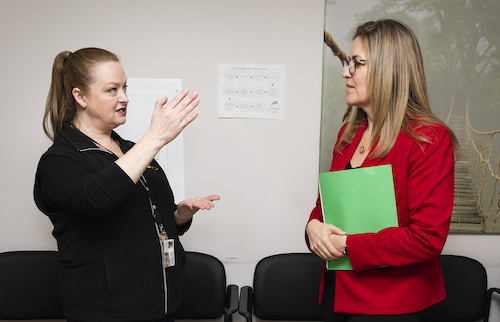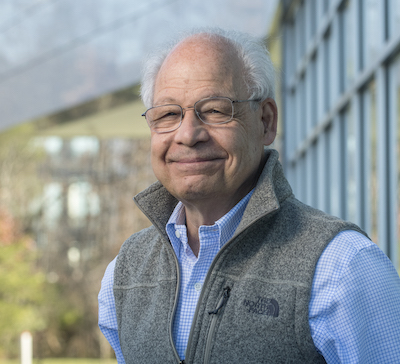George Mason University researchers will soon be building upon their impact on the physical well-being of residents in both the Northern Virginia region and across the state thanks to a pair of projects championed by U.S. Representative Jennifer Wexton (D-VA).
Mason will receive more than $1 million for a center that will help in the fight against the growing opioid epidemic, and another $820,000 to establish a clinic that will help combat Lyme Disease and other tick-borne illnesses. Federal funding for both projects came as part of the federal omnibus appropriations bill that President Biden recently signed into law to fund the government through Fiscal Year 2023.
Wexton is a member of the House Appropriations Committee whose 10th District includes Manassas, where Mason’s Science and Technology Campus is located, as well as two Mason and Partner (MAP) Clinic locations that provide clinical care to underserved populations in Fairfax and Prince William counties.

With its one-time federal investment of $1,037,519, the future Empowered Communities Partnership Center will leverage public and private partnerships in addressing abuse among high-risk individuals experiencing substance and opioid abuse disorder. That collaboration will include existing Virginia statewide and local criminal justice and public health partners for expanded coordination of care for those with opioid use disorder reentering the community following their release from incarceration.
“This federal funding that I've delivered for George Mason will help high-risk Virginians struggling with substance-use disorder get the help they need as they reenter the community after incarceration,” Wexton said. “The opioid crisis has hit Virginia communities hard, and it is an issue I've worked closely on throughout my career in public service. I applaud Mason's efforts to establish this new center, which will help leverage public-private partnerships among local community leaders in our Commonwealth to prevent overdoses and save lives.”
According to state statistics, clients with substance abuse disorders transitioning from incarceration are up to 129 times more susceptible to overdose in the first two weeks following their release.
The center will work to prevent overdose opioid use and limit the burden to the state healthcare system by coordinating care across systems of support and developing new models of community care. The project will document the differential impacts substance abuse has on underrepresented populations and use that evidence to support effective new implementation approaches that improve connection to and engagement with integrated community services.
Rebecca Sutter, a professor of nursing within Mason’s College of Public Health and the co-director of the Mason and Partners (MAP) Clinics and the Empowered Communities Program, will oversee the center.
“We are building upon our programs to expand our impact,” Sutter said. “This is a partnership center with the local community guiding its work while acting as a learning laboratory for the next generation of public health strategists and leaders.”
Nationwide, federal and local officials are reporting alarming spikes in drug overdoses, with evidence suggesting that continued isolation from the global pandemic, economic devastation, and disruptions to the drug trade are fueling the surge. This partnership center will help improve coordination and promote readiness among health departments, community members, healthcare providers, public health, law enforcement and government agencies for local, regional, and state impact.
“Funding for mental health and substance use prevention allows the College of Public Health and our Mason and Partner (MAP) Clinics to expand our impact and prepare future providers for evidence-based practice in screening and assessment, treatment, and recovery,” said Melissa J. Perry, dean of the College of Public Health. “We are grateful to Representative Wexton for her continued support for these mission-critical areas of research and practice and for her commitment to meeting the needs of high-risk individuals experiencing substance and opioid use disorder. Through the new partnership center and learning laboratory, we look forward to continued collaboration with the local community and our elected officials to make a lasting impact in Northern Virginia.”
According to the most recent data from the Virginia Department of Health, overdoses in the commonwealth resulted in more than 21,000 emergency room visits in 2021, and more than 10,800 from opioids alone. The number of fatal overdoses from all substances that year was an increase of 69 percent from 2019, while the number of fatal opioid overdoses in 2021 had increased by 80 percent since 2019. Fentanyl was involved in nearly 72 percent of all of Virginia’s drug overdose deaths in 2020.
Available data indicate that a disproportionate number of opioid overdose deaths are in persons living in rural areas of less privileged socioeconomic status.

The Center for Advanced Testing: Tick-Borne Disease Diagnostic Clinic is the other project for which Wexton successfully fought to have funded to meet the needs of Northern Virginians by combating the rising number of tick-borne illnesses throughout Virginia.
Buoyed by the one-year federal investment of $820,000, the center will provide a suite of unmatched Mason technologies for diagnostic testing that will lead to improved early intervention and reduce illness.
“I'm proud to have secured federal funding that will help George Mason begin their unique diagnostic testing technology for tick-borne illnesses like Lyme disease,” Wexton said. “Mason scientists have been leaders in helping to prevent long-term illness and disability from these diseases, which are becoming more common in Virginia and across the country. I'm grateful to Mason for their work on this issue, and look forward to this next step in their groundbreaking program which will keep more Virginians healthy and safe.”
Like many parts of the United States, Virginia is experiencing an increase in tick-borne illnesses, with particularly high numbers of confirmed cases in Fauquier, Loudoun, Prince William, and Rappahannock counties. Lyme disease and other tick-borne illnesses are causing great suffering and economic loss to the state.
Early diagnosis for tick-borne diseases such as Lyme disease is critical in preventing significant morbidity and mortality, but there is currently a shortage of adequate and accessible testing throughout Virginia.
“This is really going to be special,” said Lance Liotta, a University Professor and center co-director and medical director of Mason’s Center for Applied Proteomics and Molecular Medicine within Mason’s College of Science. “Our unique medical technology to diagnose tick-borne diseases began many years ago with a Mason summer student Temple Douglas working in Alessandra Luchini's lab, and has been developed and perfected by funding from the [National Institutes of Health], the Cohen Foundation, and the Commonwealth of Virginia. Our team is thrilled to expand our clinical trial under this special funding to now offer routine testing for the entire commonwealth. Early diagnosis of Lyme disease can be followed by immediate treatment to prevent suffering.”
The federal funds will be used to launch the clinical deployment of diagnostic testing that will allow for a quicker and more efficient diagnosis.
Mason scientists have developed a technology for patient sample self-collection that does not require refrigerated shipment and storage. One patient sample can be used to detect signatures derived directly from all the major known tick-borne pathogens.
The technology, which has undergone scientific peer review and been supported by NIH funding, is amenable to epidemiologic surveillance and will be used to screen high-risk outdoor workers exposed to tick bites, as well as hikers along the Appalachian Trail and others.
The Mason test addresses the urgent unmet need of accurately diagnosing and treating early-stage tick-borne infections before they progress to cause chronic suffering and disability, including cognitive impairment and cardiac failure. Urine samples or ticks collected from patients who come to the clinic with a tick bite will be shipped out for rapid analysis. Results will be communicated to the requesting physician within 24 hours, enabling immediate initiation of appropriate therapy if pathogens are present.
Mason officials anticipate seeing 600 samples per month, and will be relying on high-tech automation equipment to help meet the demand from the five clinics set up throughout Virginia’s 10th District.
“Mason scientists possess a strong commitment to leverage our research, intellect, and creativity to solve grand challenges that positively impact our communities, both locally and around the world,” said Fernando Miralles-Wilhelm, dean of Mason’s College of Science. “We are grateful to Representative Wexton for her continued support for these critical areas of research and for her commitment to helping us address these medical needs of Northern Virginians.”
The conventional serology test for Lyme disease, which has low sensitivity and specificity, usually takes about 6 to 12 days to process at major diagnostic laboratories. In contrast, the Mason test turnaround time will be as soon as 24 hours, and can test the ticks as well as the samples.
Mason’s proposal was submitted by Liotta and Ali Andalibi, the senior associate dean and chief scientific officer for the College of Science.
Related News
- February 10, 2026
- January 20, 2026
- July 14, 2025
- May 15, 2024
- January 9, 2024
